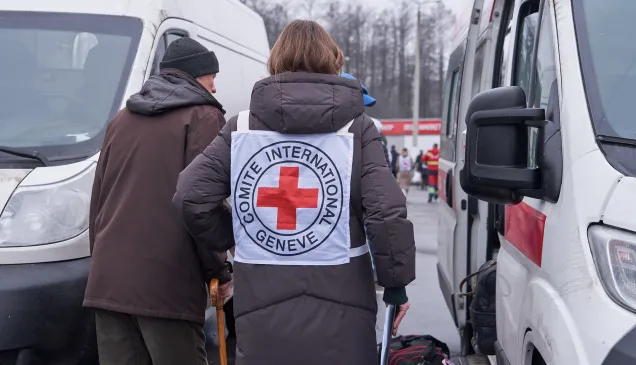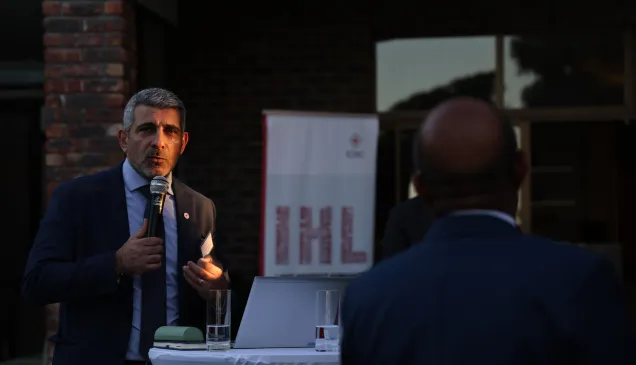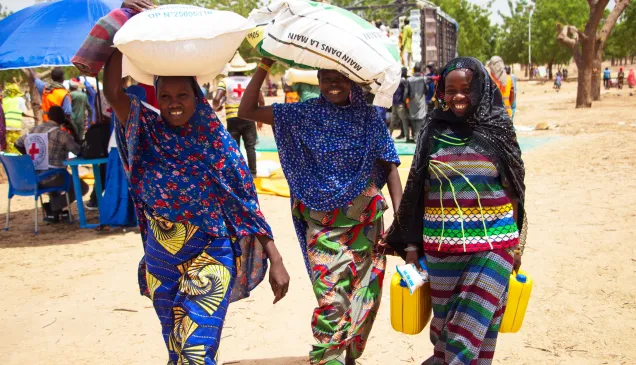Statutes of the International Committee of the Red Cross
Adopted on 21 December 2017 and came into force on 1 January 2018; amended on 5 February 2025
Download the Statutes of the ICRC
The International Committee of the Red Cross (ICRC) is an impartial, neutral and independent organization whose exclusively humanitarian mission is to protect the lives and dignity of victims of armed conflict and other situations of violence and to provide them with assistance.
The ICRC also endeavours to prevent suffering by promoting and strengthening humanitarian law and universal humanitarian principles.
Established in 1863, the ICRC is at the origin of the Geneva Conventions and the International Red Cross and Red Crescent Movement. It directs and coordinates the international activities conducted by the Movement in armed conflicts and other situations of violence.
Article 1. International Committee of the Red Cross
- The ICRC is an organization formally recognized in the Geneva Conventions, their Additional Protocols, and the Statutes of the International Red Cross and Red Crescent Movement (hereafter “the Movement”), and by the International Conferences of the Red Cross and Red Crescent (hereafter “the International Conferences”).
- It is one of the components of the Movement, which also comprises the National Red Cross and Red Crescent Societies (“the National Societies”) and the International Federation of Red Cross and Red Crescent Societies (“the Federation”).
Article 2. Legal status
- The ICRC is an association governed by Article 60 and following of the Swiss Civil Code.
- In order to fulfil its humanitarian mandate and mission, the ICRC enjoys a status equivalent to that of an international organization and has international legal personality in carrying out its work.
Article 3. Headquarters, emblem, logo and motto
- The headquarters of the ICRC is in Geneva, Switzerland.
- The ICRC’s emblem is a red cross on a white ground, which it is entitled to use at all times, in accordance with the Geneva Conventions and their Additional Protocols.
- The ICRC’s logo is a red cross on a white ground surrounded by two concentric circles, within which are the words “COMITÉ INTERNATIONAL GENÈVE” (International Committee Geneva), sitting on top of the appropriate initials (“ICRC” in English or “CICR” in French).
- The ICRC’s motto is “Inter arma caritas.” It likewise acknowledges the motto “Per humanitatem ad pacem.”
Article 4. Role
1. The role of the ICRC shall be in particular:
(a) to maintain and disseminate the Fundamental Principles of the Movement, namely humanity, impartiality, neutrality, independence, voluntary service, unity and universality;
(b) to recognize any newly established or reconstituted National Society which fulfils the conditions for recognition set out in the Statutes of the Movement, and to notify other National Societies of such recognition;
(c) to undertake the tasks incumbent upon it under the Geneva Conventions, to work for the faithful application of international humanitarian law applicable in armed conflicts and to take cognizance of any complaints based on alleged breaches of that law;
(d) to endeavour at all times – as a neutral institution whose humanitarian work is carried out particularly in time of international and other armed conflicts or internal strife – to ensure the protection of and assistance to military and civilian victims of such events and of their direct results;
(e) to ensure the operation of the Central Tracing Agency as provided in the Geneva Conventions;
(f) to contribute, in anticipation of armed conflicts, to the training of medical personnel and the preparation of medical equipment, in cooperation with the National Societies, the military and civilian medical services and other competent authorities;
(g) to work for the understanding and dissemination of knowledge of international humanitarian law applicable in armed conflicts and to prepare any development thereof;
(h) to carry out mandates entrusted to it by the International Conference.
2. The ICRC may take any humanitarian initiative which comes within its role as a specifically neutral and independent institution and intermediary, and may consider any question requiring examination by such an institution.
Article 5. Relations with the other components of the Movement
- The ICRC shall maintain close contact with the National Societies. In agreement with them, it shall cooperate in matters of common concern, such as their preparation for action in times of armed conflict, respect for and development and ratification of the Geneva Conventions, and the dissemination of the Fundamental Principles of the Movement and international humanitarian law.
- In the situations foreseen in Article 4, paragraph 1(d), which require coordination of assistance provided by National Societies of other countries, the ICRC, in cooperation with the National Society of the country or countries concerned, shall coordinate such assistance in accordance with the agreements concluded with the other components of the Movement.
- The ICRC shall maintain close contact with the Federation. It shall cooperate with the latter in matters of common concern in accordance with the Statutes of the Movement and the agreements concluded between the two organizations.
Article 6. Relations outside the Movement
The ICRC shall maintain relations with government authorities and any national or international institution whose assistance it considers useful.
Article 7. Members of the ICRC
- The ICRC shall comprise between 15 and 25 members who shall be co-opted from among Swiss citizens.
- ICRC members shall carry out their functions on a voluntary basis. The president and vice-president shall constitute exceptions to this rule.
- The ICRC can designate members as honorary members when their term of office ends.
Article 8. Governing bodies of the ICRC
The governing bodies of the ICRC are:
(a) the Assembly;
(b) the Assembly Council;
(c) the Office of the President;
(d) the Directorate;
(e) the Internal Audit Unit;
(f) the Data Protection Independent Control Commission (Data Protection Commission).
Article 9. Assembly
- The Assembly is the ICRC’s supreme governing body. It is in charge of oversight of the
organization and ensures that it carries out its mission. It defines the ICRC’s institutional strategy, formulates policy and approves the budget and accounts. - The Assembly shall be composed of the members of the ICRC. It shall be collegial in character.
Article 10. Assembly Council
- The Assembly Council is a sub-body of the Assembly. It ensures the smooth functioning
of the ICRC, in particular as regards human resources management and financial management, and aids the Assembly in its tasks. To that end, the Assembly Council communicates regularly with the Directorate. - The Assembly Council shall be composed of five to seven members elected by the Assembly, including the president and vice-president.
Article 11. Office of the President
- The president assumes primary responsibility for the ICRC’s relations with outside bodies.
- As chair of the Assembly and the Assembly Council, the president ensures that the responsibilities assigned to these two bodies remain under their control and closely monitors the running of the ICRC.
- The president is assisted in carrying out his1 duties by the vice-president and, where applicable, a second vice-president.
1 Throughout this text, pronouns and adjectives in the masculine gender apply equally to men and women, unless otherwise specified.
Article 12. Directorate
- The Directorate is the ICRC’s executive body. It directs the administration, which comprises all ICRC staff, except for the Internal Audit Unit. It is responsible for running the administration and ensuring the ICRC’s operational effectiveness.
- The Directorate shall comprise the director-general and between three and seven directors.
- The Directorate shall be chaired by the director-general.
Article 13. Power of representation
All commitments made by the president, the director-general or any person authorized by the latter shall be binding on the ICRC.
Article 14. Internal Audit Unit
- The Internal Audit Unit assesses, independently of senior management, the extent to which the ICRC is in control of its activities. It shall proceed through internal operational and financial audits.
- The Internal Audit Unit’s work covers the entire ICRC, both field and headquarters. Its aim shall be to assess, on an independent basis, the organization’s performance and the pertinence of the means deployed in relation to the ICRC’s strategy. It reports directly to the Assembly.
- In the area of finance, the role of the Internal Audit Unit shall complement that of the external auditing firm.
Article 15. Data protection Independent Control Commission
- The Data Protection Independent Control Commission (Data Protection Commission) shall check, independently of the other bodies and the Administration, that the ICRC’s processing of personal data complies with its Rules on Personal Data Protection and other applicable rules, and shall rule on the rights of individuals when their cases or other data-protection cases are referred to it.
- The Commission shall encompass the activities of the ICRC in its entirety, both at headquarters and in the field.
- The Commission shall regularly report to the Assembly about its work.
Article 16. Assets and financial oversight
- The principal assets of the ICRC shall be the contributions of governments and National
Societies, as well as funds from private sources and its income from securities. - These assets, and such capital funds as it may have at its disposal, shall alone, to the exclusion of any personal or collective liability of its members, guarantee the commitments entered into by the ICRC.
- The utilization of those assets and funds shall be subject to independent financial oversight, both internally (by the Internal Audit Unit) and externally (by one or more auditing firms).
- In case of dissolution of the ICRC, the assets at its disposal shall be awarded in their entirety to one or more tax-exempt organizations pursuing humanitarian goals. Under no circumstances may such assets be returned to the ICRC’s donors, individual founders, or members, nor used in whole or in part for their profit in any manner whatsoever.
Article 17. Internal Regulations
The Assembly shall provide for the implementation of the present Statutes, in particular by establishing Internal Regulations.
Article 18. Amendment
- The Assembly may amend the present Statutes at any time. Any amendment shall be placed on the agenda of two separate meetings and be discussed on those occasions.
- Any changes to the Regulations must be approved by a two-thirds majority of ICRC members.
Article 19. Entry into force
The present Statutes, adopted on 21 December 2017, shall replace the Statutes of the International Committee of the Red Cross of 21 June 1973, as amended on 20 July 1998, 8 May 2003, 18 December 2014 and 19 November 2015. They shall come into force on 1 January 2018.
This English version of the ICRC's Statutes is a translation of the French original. The French remains the authentic text.



